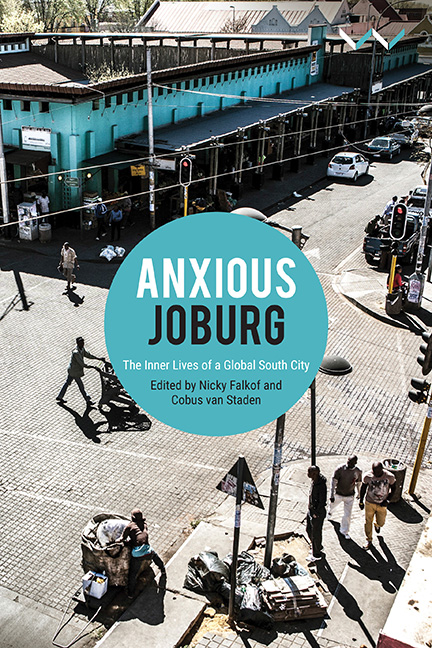Book contents
4 - ‘The White Centreline Vanishes’: Fragility and Anxiety in the Elusive Metropolis
Published online by Cambridge University Press: 16 June 2021
Summary
‘IMAGINE THERE ARE NO WHITES‘
In March 2016, a young white academic and colleague of mine, Terblanche Delport, sparked outrage at a Johannesburg conference at the University of the Witwatersrand. As part of an imagined demise of structures of white privilege, Delport called on white people in South Africa ‘to commit suicide as an ethical act’. Or, as was reported by the PRAAG (Pro-Afrikaans Action Group) website, ‘A lecturer in philosophy yesterday said at a radical anti-white, anti-Afrikaner conference at the University of the Witwatersrand that “whites should die”.’ Here is perhaps the most controversial part of his written paper:
The reality [in South Africa] is that most white people spend their whole lives only engaging black people in subservient positions – cleaners, gardeners, etc. My question is then how can a person not be racist if that's the way they live their lives? The only way then for white people to become part of Africa is to not exist as white people anymore. If the goal is to dismantle white supremacy, and white supremacy is white culture and vice versa, then the goal has to be to dismantle white culture and ultimately white people themselves. The total integration into Africa by white people will also automatically then mean the death of white people as white as a concept would not exist anymore. (Delport, pers. comm., 16 March 2016)
Provocative as Delport's statements were, it seems clear from reading this extract that his primary target was white privilege, that is, white culture within South Africa as a structure of domination – what many critics today refer to as ‘whiteness’ (Ahmed 2007; Ngo 2017; Yancy 2012). Delport was, of course, not alone in offering such a speculative picturing of white demise, as the titles of two recent books – Ferial Haffajee's What If There Were No Whites in South Africa? (2015) and Nicky Falkof 's The End of Whiteness (2016) – make clear. Nonetheless, as quickly became apparent, his remarks touched a nerve. SA-News.com announced that Delport had ‘publicly called for the genocide of White South Africans’ and lamented how unfortunate it was that he had ‘not been accused of hate speech’.
- Type
- Chapter
- Information
- Anxious JoburgThe Inner Lives of a Global South City, pp. 91 - 114Publisher: Wits University PressPrint publication year: 2020



